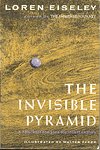

Fai clic su di un'immagine per andare a Google Ricerca Libri.
|
Sto caricando le informazioni... The Invisible Pyramid (1970)di Loren Eiseley
 Nessuno Sto caricando le informazioni...
Iscriviti per consentire a LibraryThing di scoprire se ti piacerà questo libro. Attualmente non vi sono conversazioni su questo libro.   ) )Thanks for the recommendation. I found myself really relating to his almost casual style of thought exploration, and despite some reservations I had with his admiration for Francis Bacon I found myself unable to essentially disagree with anything he said. He has a bravery to try to objectively consider ideas that conflict with his personal prejudices, like the possibility that there is an innate human drive to consume the planet until no option remains but escape to outer space. After a long discussion of this possibility and its implications, he concludes that our destructiveness is not innate as demonstrated by our four million years of hunting and gathering. He distinguishes this long experience of our "first world" of nature from our more recent immersion in the "second world" of culture. Complex agricultural society plunged us exclusively into this second world, enabling us for the first time to observe nature with the detachment that would give rise to modern science, the "invisible pyramid." (p.87) Before that, earlier civilizations devoted similar attention and energy to the construction of the real pyramids which memorialized their belief that the second world is of primary importance. We, the "world eaters," continue to manifest this now demonstrably mistaken belief in our current society as we gobble up every non-renewable resource as fast as we can. Eiseley says that, propelled by modern science, we are the most aggressive society in history, that "the future has become our primary obsession." (p.105) We took to heart all of Bacon's scientific genius, but we ignored his belief that the all learning should contribute to the enlightened life. (p.69) Science, and the epistemology of any culture, pursues a comprehensive understanding of the natural world that is meaningful to us in cultural terms. While our modern science is of great value on its own terms, on a larger scale, its value is less certain. Through myth, past cultures "had achieved what modern man in his thickening shell of technology is only now seeking unsuccessfully to accomplish." (p.114) The question that arises to me is, wrapped up in these unquestionables of science and technology, is there a kind of social power that desperately needs to be questioned with at least as much vigor as the power of the state and capital? Eiseley does not break it down this way, and I suspect he would resist my doing so. He saw the hippies (contemporary to Eiseley's writing) as another manifestation of the same rejection of tradition--"Faustian hunger" (p.109)--that remains our culture's greatest pride and most lethal attribute. He is conservative because change--restlessness--is what drives the world eaters. But his conservative impulse that would be desirable in a sustainable culture seems incompatible with the task of changing our unsustainable one. This is probably the source of the resignation I detected, which bothered me a little bit throughout the work. In the end Eiseley expresses a sincere and heartfelt love for the world: we must make a "conscious reentry into the sunflower forest" (p.155) which our culture has turned into "an instrument," a "mere source of materials." (p.143) If we succeed in doing so, he imagines that we will have realized something of the "axial" values of Christ, Buddha, Confucius, and Lao-Tse. But when he associates the social tumult of the 1960s with the culture of the world eaters, he presents a real challenge to the possibility of the social revolution that is required to achieve the end he desires. nessuna recensione | aggiungi una recensione
Essays.
History.
Science.
Nonfiction.
HTML:A revered ecologist and conservationist examines the origins and possible futures of humankind within the context of the Space Age, masterfully �??[communicating] the awesome spectacle of our environmental crisis�?� (New York Times Book Review) To read Loren Eiseley is to renew a sense of wonder at the miracles and paradoxes of evolution and the ever-changing diversity of life. In this brilliant collection, he considers the cosmological significance and ultimate meanings of our evolutionary history, offering a series of profound, lyrical meditations on the origins and possible futures of humankind against the backdrop of the Apollo landings. As Western civilization attains new heights of scientific awareness and technological skill, he asks, is it also blind to its own limits and destructive capacities? Always a fond observer of the natural world, Eiseley makes a newly urgent, environmentalist plea in The Invisible Pyramid: we must protect the fragile �??world island�?� against our unchecked power to pollute and consume it. �??A relentless, haunting, and haunted figure devils the man [Eiseley] and twists from him some of the best prose we have. . . . Eiseley is a master of significant anecdote. There is an unstated but real gothic terror prowling behind his vision.�?� �??New York Times Non sono state trovate descrizioni di biblioteche |
Discussioni correntiNessunoCopertine popolari
 Google Books — Sto caricando le informazioni... Google Books — Sto caricando le informazioni...GeneriSistema Decimale Melvil (DDC)901.9History and Geography History Philosophy & theoryClassificazione LCVotoMedia: (4.17) (4.17)
Sei tu?Diventa un autore di LibraryThing. |
||||||||||||||||||||||||||||||||||||||||||||||||||||||||||||||||||||||||||||||||||||||||||||||||||||||||||||||||||||||||||